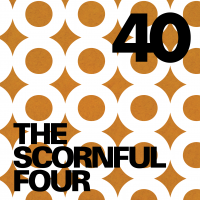
By Nick DerisoAll due respect to Nelson Riddle, but this didn't seem like it would work.
“Only the Lonely," at first—even to Sinatra—felt more temperamentally suited to Gordon Jenkins, the man most closely associated with much of Frank Sinatra's more string-oriented, darker work. (See the very good CD “September of My Years," featuring “It Was A Very Good Year," from 1965.)
But Sinatra and Riddle went way back. In fact, Frank had known the arranger since 1953, his second recording session for Capitol. (Riddle, by the way, was a trombonist with Tommy Dorsey, with whom Sinatra had also apprenticed with as a boy singer.)
Perhaps, we should have guessed that Nelson knew just how to help nudge “Only the Lonely" into becoming one of the high watermarks in this almost telepathic relationship.
From the start, Riddle was a more nuanced, subtle arranger—but that was primarily through his artistry in using strings within a big-band lineup. Their work together thus far had helped solidified Sinatra's second career as one of urbane romanticism—that is, his best tunes seemed to have a very adult attitude, one colored by love's losses. A kicking big band that can swoon down into a quiet string interlude will do that. It was, quite simply, a brilliant accompaniment to Sinatra's slightly weathered and oh-so measured mid-career style.
But this would be different, a contemplative examination of quieter, more difficult themes.
Inklings of their mid-tempo genius came with “In the Wee Small Hours," the set of torch songs (a kind of precursor in this early age for themed albums like the ones Pink Floyd, Yes, Rush, and so on, later did so well) released in the spring of 1955. His 1957 all-ballads release “Where Are You," produced by Jenkins, followed more upbeat efforts—but for me it always seemed a little too obvious.
Sinatra had planned to record “Only the Lonely" with Jenkins, but he was unavailable. This led Frank back to the one that brung him, Nelson Riddle.
Lucky for us: The result is Sinatra's greatest ballad set—and this is like saying the Beatles' dewy-est pop song, Muddy Waters' greasy-est blues song, Madonna's most contrived persona.
It's saying something.
Turns out, Riddle made an even darker album that Jenkins might have—and with a larger, more expressive orchestra. The result has a nearly classical feel, with none of the over-the-top swagger and all of the easy late-night atmosphere that Sinatra at his best could conjure. (The difference is, it's not boozy like so much of his 1960s stuff.)
The man is in complete control of is voice, too. Pulling vocals over the beat, holding notes past the end of a stanza, sustaining his own words until you hear the cracks in his voice and, you become certain, his heart.
Nick's Picks: the shattering “Angel Eyes," “Guess I'll Hang My Tears Out To Dry," “Ebb Tide," and—OK, this is getting long—"One for My Baby."
Graceful and heartbreaking, shadowy but never pitiful. I can listen to this album every night for the rest of my life.
“Only the Lonely," at first—even to Sinatra—felt more temperamentally suited to Gordon Jenkins, the man most closely associated with much of Frank Sinatra's more string-oriented, darker work. (See the very good CD “September of My Years," featuring “It Was A Very Good Year," from 1965.)
But Sinatra and Riddle went way back. In fact, Frank had known the arranger since 1953, his second recording session for Capitol. (Riddle, by the way, was a trombonist with Tommy Dorsey, with whom Sinatra had also apprenticed with as a boy singer.)
Perhaps, we should have guessed that Nelson knew just how to help nudge “Only the Lonely" into becoming one of the high watermarks in this almost telepathic relationship.
From the start, Riddle was a more nuanced, subtle arranger—but that was primarily through his artistry in using strings within a big-band lineup. Their work together thus far had helped solidified Sinatra's second career as one of urbane romanticism—that is, his best tunes seemed to have a very adult attitude, one colored by love's losses. A kicking big band that can swoon down into a quiet string interlude will do that. It was, quite simply, a brilliant accompaniment to Sinatra's slightly weathered and oh-so measured mid-career style.
But this would be different, a contemplative examination of quieter, more difficult themes.
Inklings of their mid-tempo genius came with “In the Wee Small Hours," the set of torch songs (a kind of precursor in this early age for themed albums like the ones Pink Floyd, Yes, Rush, and so on, later did so well) released in the spring of 1955. His 1957 all-ballads release “Where Are You," produced by Jenkins, followed more upbeat efforts—but for me it always seemed a little too obvious.
Sinatra had planned to record “Only the Lonely" with Jenkins, but he was unavailable. This led Frank back to the one that brung him, Nelson Riddle.
Lucky for us: The result is Sinatra's greatest ballad set—and this is like saying the Beatles' dewy-est pop song, Muddy Waters' greasy-est blues song, Madonna's most contrived persona.
It's saying something.
Turns out, Riddle made an even darker album that Jenkins might have—and with a larger, more expressive orchestra. The result has a nearly classical feel, with none of the over-the-top swagger and all of the easy late-night atmosphere that Sinatra at his best could conjure. (The difference is, it's not boozy like so much of his 1960s stuff.)
The man is in complete control of is voice, too. Pulling vocals over the beat, holding notes past the end of a stanza, sustaining his own words until you hear the cracks in his voice and, you become certain, his heart.
Nick's Picks: the shattering “Angel Eyes," “Guess I'll Hang My Tears Out To Dry," “Ebb Tide," and—OK, this is getting long—"One for My Baby."
Graceful and heartbreaking, shadowy but never pitiful. I can listen to this album every night for the rest of my life.


























